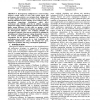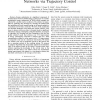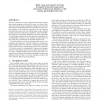ASPDAC
2010
ACM
13 years 10 months ago
2010
ACM
Heterogeneous multiprocessor system-on-chips (MPSoCs) which consist of cores with various power and performance characteristics can customize their configuration to achieve higher ...
WIOPT
2010
IEEE
13 years 10 months ago
2010
IEEE
—Energy optimization is a significant component of Wireless Sensor Network (WSN) design. In this paper we consider transmission energy optimization in WSNs where messages are co...
VTC
2010
IEEE
13 years 10 months ago
2010
IEEE
— Much work has been done aiming at minimization of energy consumption for transmission of information in energy constrained wireless networks. However, most of them assume uncod...
TPDS
2010
13 years 10 months ago
2010
—This paper derives simple, yet fundamental formulas to describe the interplay between parallelism of an application, program performance, and energy consumption. Given the ratio...
PVLDB
2010
13 years 10 months ago
2010
The area of cluster-level energy management has attracted significant research attention over the past few years. One class of techniques to reduce the energy consumption of clus...
SIGOPS
2008
13 years 10 months ago
2008
Power management strategies for embedded systems typically rely on static, application driven deactivation of components (e.g. sleep, suspend), or on dynamic voltage and frequency...
IEEEHPCS
2010
13 years 10 months ago
2010
Network-on-chip (NoC) architectures adopted for Systemon-Chip (SoC) are characterized by different trade-offs between latency, throughput, communication load, energy consumption, ...
CORR
2010
Springer
13 years 10 months ago
2010
Springer
Abstract—This paper studies the problem of distributed computation over a network of wireless sensors. While this problem applies to many emerging applications, to keep our discu...
SAC
2008
ACM
13 years 11 months ago
2008
ACM
Energy-efficiency has been an important system issue in hardware and software designs to extend operation duration or cut power bills. This research explores systems with probabil...
SQJ
2002
13 years 11 months ago
2002
Acknowledging the intense requirement for low power operation in most portable computing systems, this paper introduces the notion of energy efficient software design and proposes ...



